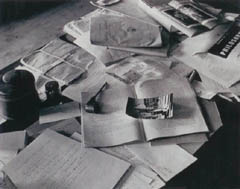
Your Problem: Cluttered Desk
I love it when people insist that their clutter is actually their personal organizational system. Yeah, right. That’s why the average corporate worker loses 14 days a year looking for things he can’t find. Trust me, taking the time up front to file a document is faster than trying to unearth it from a two-foot stack of papers later.
SOLUTION #1: MAKE A CLEAN SWEEP
Sort through everything on your desk and ask, “Do I really need this?” Be ruthless. You’ll find that 80 percent of it is fax cover sheets, junk mail, or old memos. As for personal items, keep just one or two. If seeing a photo of your friends gives you a boost, great. But when your desk is covered in snapshots, it’s distracting.
SOLUTION #2: CREATE A FILING SYSTEM
Keep a step-file on your desk for current projects and move things you don’t refer to often to a filing cabinet. Then, think of how you’ll try to retrieve the material. Is it a contact, an employee manual, or a legal document? If you can never find anything in your files, then you’re probably saving more then you need to.

Albert Einstein’s desk in Princeton, New Jersey, 1955
SOLUTION #3: CONTROL THE FLOW
You need one inbox, one outbox – and I’m a big fan of the expandable “tickler” file, which fits into a drawer and divides the calendar by days in the month. Drop invitations, meeting reminders, travel itineraries, and any work you need to do at a later date into the appropriate slot. Toss junk mail immediately, and place magazines and newspapers in one spot. Instead of letting business cards pile up, record them right away in your Rolodex or computer under the person’s profession or company – you’re far more likely to remember what she does or what she wore than her last name. Instead of a zillion Post-its everywhere, keep one notebook on your desk where you write down to do list, phone messages, and notes.
SOLUTION #4: DAILY PLAN-ITS
Being organized isn’t something you do just once, I’m sorry to say; you have to maintain it. Carve out 15 minutes at the beginning or end of each day and go through your inbox so you don’t get buried in paper again.
Rothschild is the founder and CEO of Cross It Off Your List, a New York City – based organizing service.
Interviews by Sarah Van Boven and Katherine Fleming
